Keyword research requires diligence, but no matter how diligent you are, if you aren’t using the right keyword research tools, your efforts won’t amount to a lot.
To make sure that your SEO efforts pay off, you need the right keyword research strategies and the best keyword research tool to actually generate results.
In this article, let’s highlight three of the best keyword research tools you can use in 2026 and beyond. We’ll talk about their pros and cons as well as the exact keyword research features that make them stand out.
Top 3 Best Keyword Research Tools in 2026
Keyword research is basically a three-step process:
- Look for keyword ideas that people are actually searching for
- Check and assess their ranking difficulty
- Figure out the best way to rank for the target keyword/s
The best SEO keyword research tools have one thing in common: they help users boost search engine visibility and organic traffic. The three keyword tools below can help you achieve your SEO goals and drive organic results.
1. SEMrush
Whether you’re looking to generate more keyword ideas, estimate search volume, or do a competitive keyword gap analysis, Semrush is a keyword software tool you can rely on.
Using its Keyword Magic Tool, you can find the best keywords including low-competition keywords in seconds. All you have to do is click “Keyword Magic Tool”, type in a seed keyword, and Semrush will automatically generate relevant keywords:
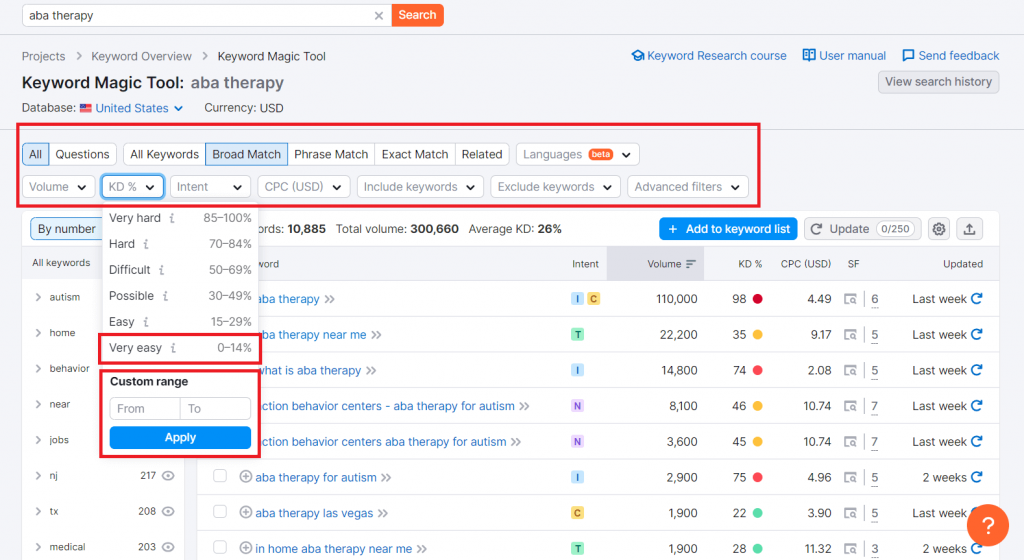
To narrow down the results, you can choose from the following categories: Broad Match, Phrase Match, Exact Match, and Related keywords.
The good thing about Semrush is it indicates the search intent for each keyword– whether they’re information, navigational, transactional, or commercial. They also categorize and label keyword difficulty from Very Easy to Very Hard.
To easily find keywords that are the easiest to rank for, you can use the filter for Keyword Difficulty, start with “Very Easy”, and work your way up. You can also set a custom range if you have a specific KD target in mind. You can further optimize your keyword research by using the Search Volume filter as well.
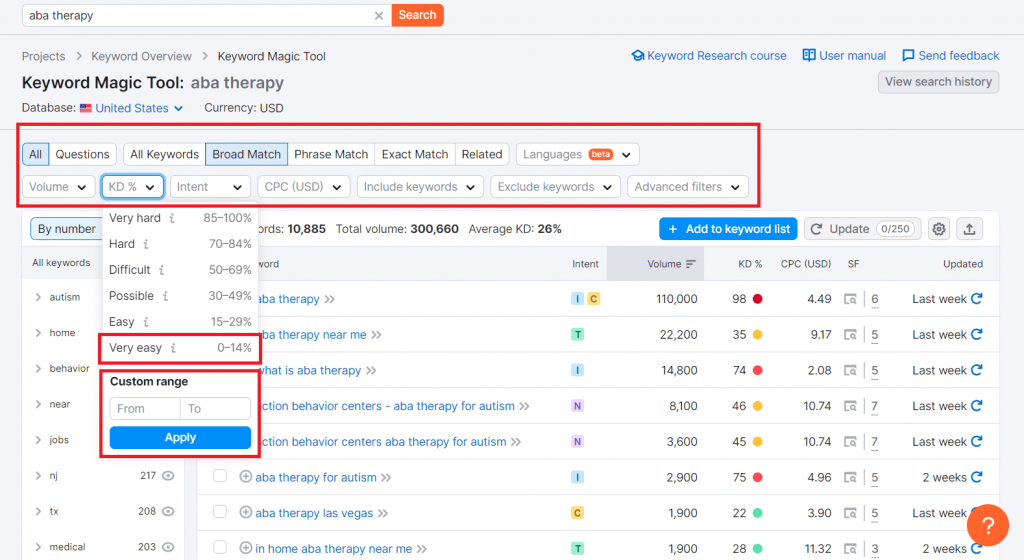
Besides the Keyword Magic Tool, Semrush is packed with other useful features for keywords search; namely:
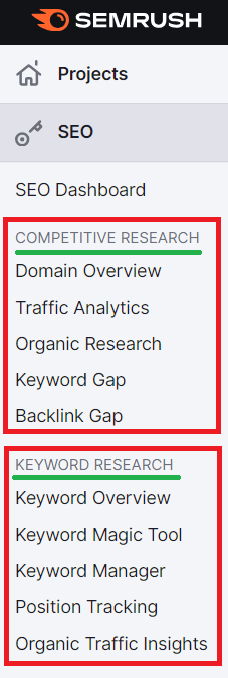
The Keyword Overview feature is the easiest way to generate a quick analysis of your target keywords, get the key metrics, and access more keyword ideas. It’s a comprehensive summary including granular keyword variations, questions, and keyword clusters. We’ll explore the rest of the features in the next few sections.
Besides generating keyword recommendations, Semrush also has an extensive range of tools for a variety of digital marketing tasks. In fact, it has over 50 different SEO tools for SEO, keyword research, content marketing, PPC, and even social media marketing.
Whether you’re a veteran SEO or just a beginner, Semrush is a comprehensive keyword research and digital marketing tool packed with great features to kickstart your campaigns.
Semrush Pros and Cons
Pros:
- Huge keyword database
- Granular keyword data
- Comprehensive feature set
- Great organic and PPC keyword research
- Extensive backlink and keyword metrics.
- Generous reporting limits and usage allowances compared to competitors
- Has a free trial
Cons:
- Only one user account per plan
- Steep learning curve, especially for less experienced users
- Expensive add-ons
- Data only covers Google
Without a doubt, Semrush has extensive keyword research and keyword analysis features. From managing target keywords to tracking keyword rankings to generating keyword suggestions and metrics, you can cover these and more with Semrush.
It might not be suitable for SEO newbies or small businesses with a limited budget. However, if you require extensive coverage and are willing to climb a steeper learning curve, Semrush is overall a savvy investment.
2. Ahrefs
Ahrefs has a robust suite of SEO tools including keyword research and seo keyword analysis. Its Keywords Explorer Tool helps you find the best SEO opportunities by checking the Matching Terms, Related Terms, and Search Suggestions.
All you have to do is click “Keywords Explorer”, choose the search engine you want to target, type in the seed keywords you want to generate more ideas from, set the target country, and click “Search”.
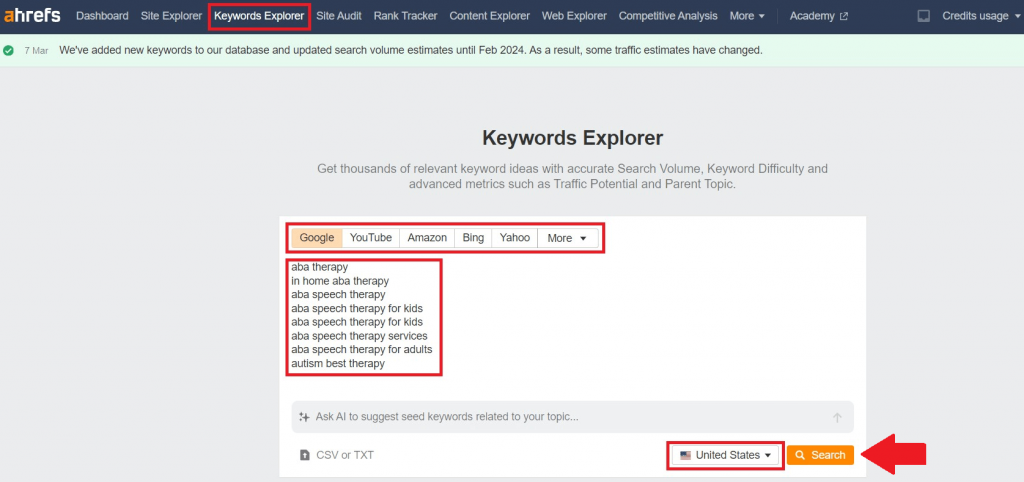
You can find thousands of keyword ideas with their corresponding metrics including search volume, keyword difficulty, Global Search Volume, CPC, SERP Features, and even the Traffic Potential. Plus, Ahrefs offers great filtering options for you to further narrow down your search.
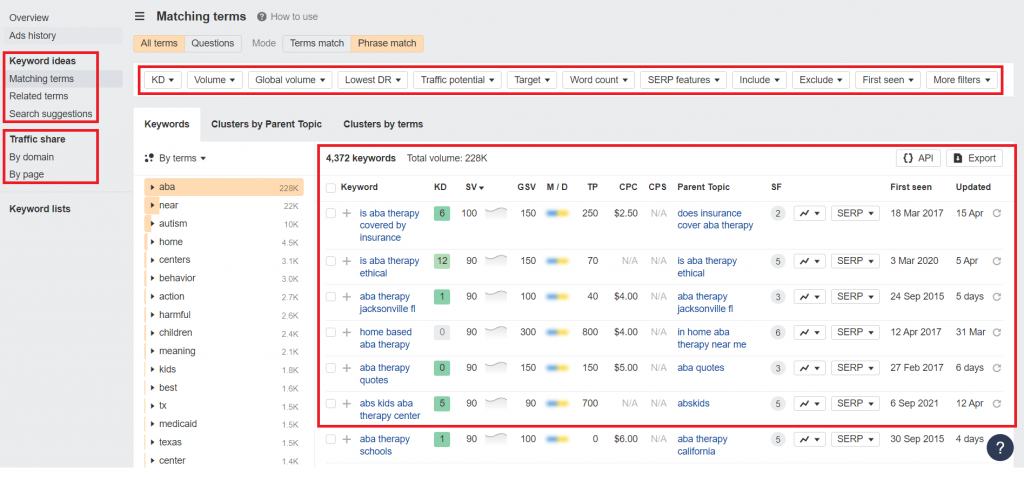
However, using too many filters can double down your monthly subscription since Ahrefs adopts usage-based pricing. But overall, Ahrefs has pretty much everything you need to do expert-level keyword research and find lucrative keyword ideas that can drive your bottom line.
Ahrefs Pros and Cons:
Pros:
- Large keyword database
- Great filtering options to narrow down keyword list
- Performs keyword research across 10 search engines
- Includes keyword research for non-search engines (YouTube, Amazon, Bing)
- With advanced estimation algorithms like estimating the number of clicks a search term will likely receive.
- Super simple to use
- Additional SEO tools, like audits, backlink analysis, competitor research, and more
Cons:
- No free trial
- Too expensive for smaller sites and businesses
- Unpopular credit-based pricing model
- Steeper learning curve for beginners.
- No automatic search intent detection
While there’s no free trial for Ahrefs’ core SEO features, they do have a free suite of other tools that you can use like the Free Keyword Generator, Keyword Rank Checker, Keyword Difficulty Checker, and keyword research for Amazon, YouTube, and Bing, among other tools.
These free keyword research tools from Ahrefs, although won’t achieve the depth of the paid account, already cover a wide array of SEO use cases. However, for serious SEO professionals, Ahrefs’s full SEO features can definitely help you gain an edge in highly competitive markets.
3. Keywords Everywhere
Imagine never having to switch back and forth between your website and Google’s Keyword Planner again. Keywords Everywhere is a user-friendly browser extension that displays all the keyword information you need directly in the Google search results and many other sites including YouTube, eBay, Etsy, Amazon, and 16+ other major platforms.
As you use the supported search engines and sites including Google, Keywords Everywhere will feed the keyword metrics you need including the Search Volume, CPC, Competition Score, SEO difficulty, Trends, and keyword ideas.
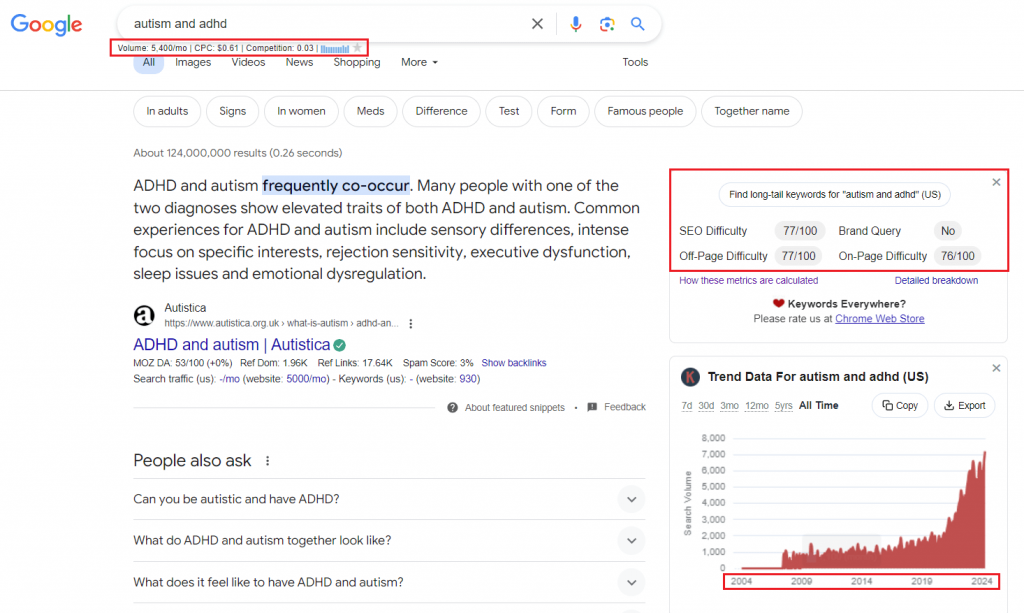
As you scroll down the search results page, you can see a bunch of keyword suggestions with their corresponding keyword metrics. You can view the Related Keywords, People Also Search for section, Trending Keywords, and Long-tail Keywords.

It’s a convenient way of finding search terms that you can rank for and discovering low-hanging fruit and queries that you wouldn’t have thought of.
You can download Keywords Everywhere on Chrome, Firefox, and Edge and use it to see keyword data across 19+ other sites besides Google search engine.
- YouTube
- Amazon
- Ebay
- Etsy
- Google Search Console
- Google Keyword Planner
- Google Analytics
- Google Trends
- Bing Search
- Yahoo Search
- X (Formerly Twitter)
- DuckDuckGo
- Soovle
- ChatGPT
- Gemini
- Claude
- Deepseek
Pros and Cons of Keywords Everywhere
Pros:
- Displays keyword data and suggestions directly on major platforms
- Cost-effective pricing (Almost 60 times cheaper than Semrush and Ahrefs)
- Bulk upload feature to analyze multiple keywords in one go
- Categorizes keyword ideas to easily expand keyword list
- Very easy and convenient to use
- Has other keyword research features for competitor research and keyword analysis
Cons:
- No backlink analysis yet
- As a browser extension, it has fewer features than the other SEO software suites
As a keyword suggestion tool and for as low as $5 per month, Keywords Everywhere delivers a lot of value. Finding keyword opportunities and keyword metrics on the go allows you to build out your list of target keywords with ease. No more switching back and forth between different tools as you can directly see the information you need right in front of you in an easy-to-digest format. We even made it to Brian Dean’s list of top keyword research tools.

Keyword Research Features of the Best Keyword Tools in 2026
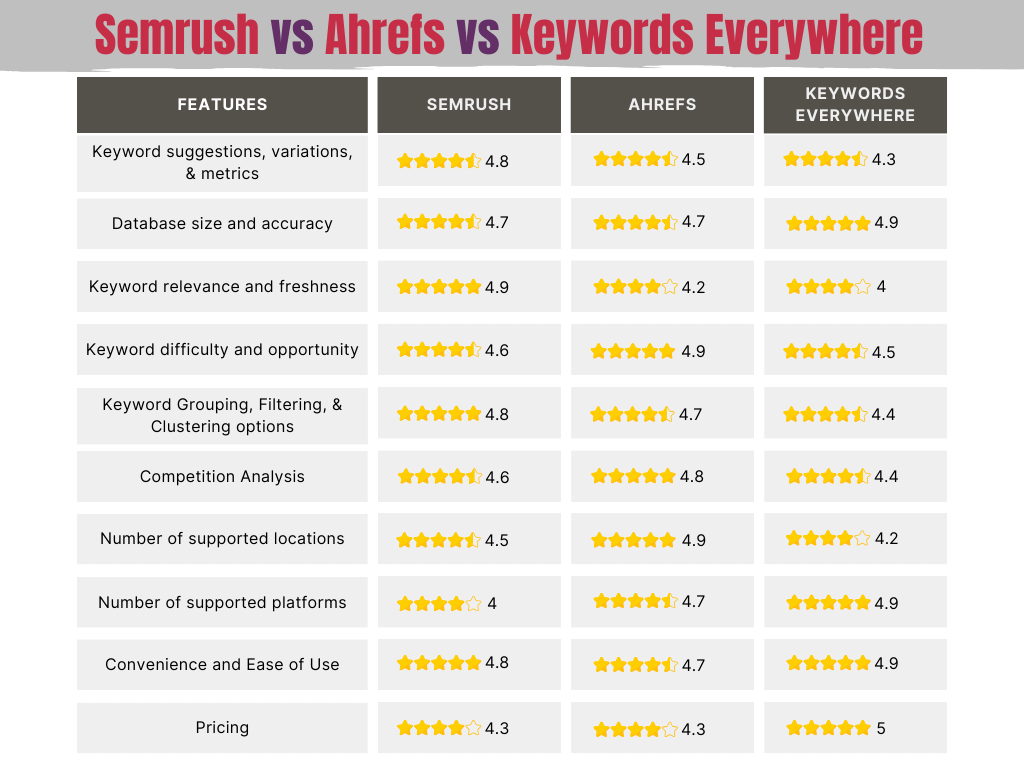
When looking for an seo keyword research tool, always look out for the following key features:
- Keyword suggestions, variations, & metrics
- Database size and accuracy
- Keyword relevance and freshness
- Keyword difficulty and opportunity
- Keyword Grouping, Filtering, & Clustering options
- Competition Analysis
- Number of supported locations
- Number of supported platforms
- Convenience and Ease of Use
- Pricing
Let’s take a close look at each feature and how the best tools should integrate them to give you a competitive advantage.
1. Keyword suggestions, variations, and metrics
Some of the most important keyword metrics a keyword research tool should display include:
- Monthly Search Volume
- Global Search Volume
- Trend Data
- Keyword Difficulty
- Cost Per Click
- Keyword ideas
Semrush, Ahrefs, and Keywords Everywhere do show all of the important metrics above. However, each tool does show additional useful metrics.
- Semrush shows the Search Intent for each keyword, helping SEOs easily identify opportunities for conversion and better SEO performance.
- Ahrefs shows Traffic Potential, which from the name itself, shows the potential traffic your page could get if you rank number 1 for that specific keyword. This metric doesn’t only account for the traffic generated from that single keyword but also factors in the overall traffic you’ll get from all its related keywords.
- Keywords Everywhere shows you the Competition Score of every keyword. This gives you an idea of how many advertisers are running ads for that particular keyword. The score ranges from 0 to 1. The higher the number, the higher the competition.
All these additional unique features each keyword tool offers is helpful, but if we are to break down the score, it has got to be:

2. Database size and accuracy
The cold, hard truth when it comes to SEO and keyword analysis tools is that no matter how sophisticated they are, they can only be directionally useful and reliable. You can’t expect all tools to be 100% accurate as even Google’s very own tools don’t guarantee pinpoint accuracy. Keyword tools, however, can help you discover and validate your topics and prioritize keywords according to your best interests. Take data with a grain of salt, but use it as a good ballpark metric to drive your SEO campaigns.
SEO tools mainly rely on scraping Google to generate data, and their output depends on the power of their scraping tool and the size of their database. That’s why you may have noticed how data varies from tool to tool.
For example for search volume, there’s a disparity in terms of data among the 3 tools.
For the keyword aba therapy:
Semrush shows a search volume of 110,000:

Ahref displays 101,000:
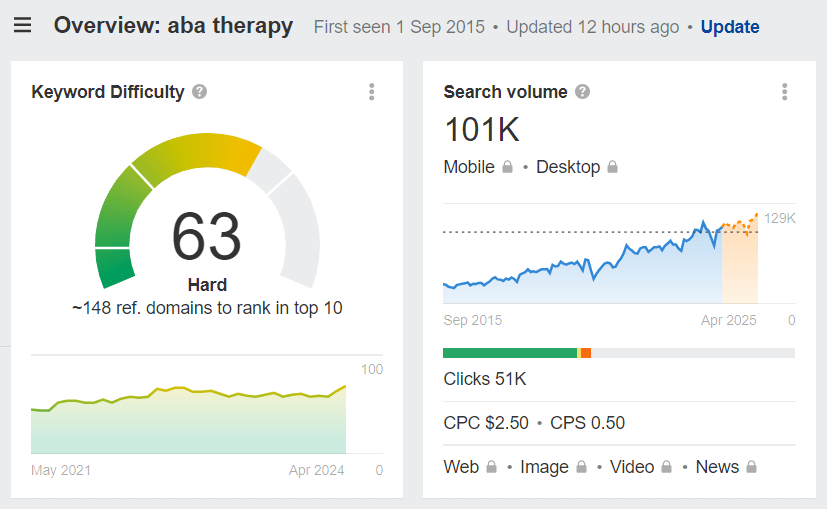
Keywords Everywhere shows 135,000:

Now, how do these best keyword tools generate data?
- SEMrush claims they have their own trusted data providers and machine learning algorithms to feed data into their databases…
- Ahrefs states that they have their own search crawlers working 24/7…
- Keywords Everywhere uses data from Google Ads Keyword Planner, but you can also go to the settings page if you want to source data from both Google Keyword Planner and Clickstream.

Again, just use keyword tools as barometers to assess your performance relative to the competitors. Besides, keywords are moving targets, making it even harder to achieve precise figures.
You can cross-reference data to make informed decisions, but if you want to benchmark your website against your main competitors, you’d want to use the same keyword search tool to compare a set of websites.
Combining data from SEO tools with webmaster tools like Google Analytics and Google Search Console will also help you get a more holistic view of your website’s performance.
Although database size doesn’t necessarily guarantee quality, it can be a factor worth looking into. In terms of database size, here’s where the three best keyword research tools stand:
- Semrush covers 25.6 billion keywords in 808 million domains, processing 500TB of raw website traffic data from over 190 countries and regions.
- Ahrefs has a keyword database of 28.9 billion keywords, covering 226 geographic regions.
- Keywords Everywhere has a database of around 5 billion keywords for each country.
So how do we score the best keyword tools in terms of data accuracy? Let’s see the numbers:

Semrush and Ahrefs add up the total keywords for each country they support including duplicates, but Keywords Everywhere covers a solid volume of 5 billion keywords per supported country.
Plus, we aggregate data directly from Google Keyword Planner, which is still the most accurate keyword tool in the world. In any case, Semrush and Ahrefs are still very strong seo keyword tools that continually get better.
3. Keyword relevance and freshness
As mentioned, a large database doesn’t automatically equate to data quality because an outdated one will only render ineffective results. Keyword relevance and freshness matter just as much, if not more.
A huge and updated keyword database is the sweet spot. This is how often each keyword research tool updates their database:
- Semrush updates their database every week.
- Ahrefs updates its database every month.
- Keywords Everywhere also updates once a month.
So where do the scores stand in terms of keyword relevance and freshness?

4. Keyword difficulty and opportunity
Ultimately, the best free keyword research tool should help you find keywords that you can potentially rank for. And to do that, SEOs need to check the Keyword Difficulty, which indicates how easy or how hard it is to rank for a given keyword.
All the three keyword research tools from this list reveal what people are searching for online, but they do present the Keyword Difficulty metric differently.
For example, for the keyword ‘is aba therapy effective’:
Semrush shows a Keyword Difficulty score of 48%, which it tagged as “Possible”. Semrush then indicates that this is “A competitive keyword to rank for. You will need well-structured and unique content.”
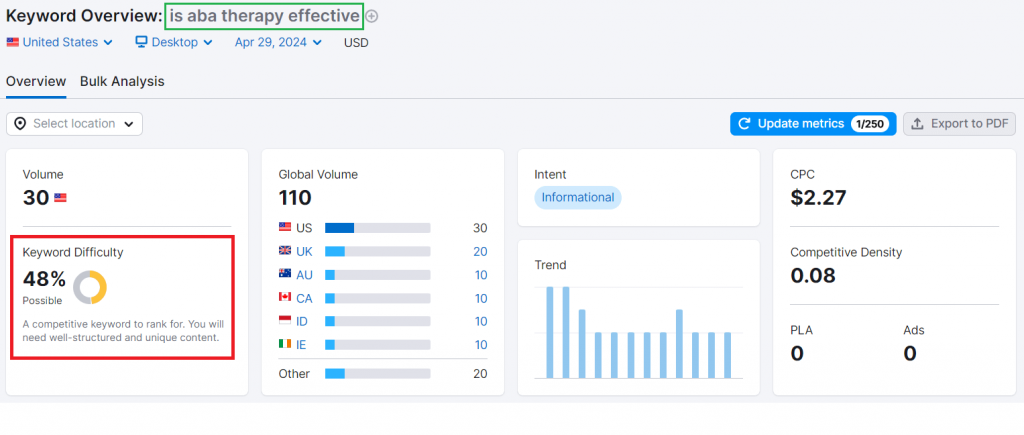
Ahrefs also ran a score of 48 but tagged the keyword as “Hard” to rank for. That’s because Ahrefs has a unique feature that tells you how many backlinks you need to earn to rank in the top 10. In this case, you need” ~77 ref. domains to rank in top 10”.
Not to mention Ahrefs shows the Traffic Potential which helps you further decide whether or not the keyword is a lucrative and worthwhile pursuit.

Keywords Everywhere has its own algorithm for scoring the SEO difficulty. Whenever you see Keywords Everywhere data, you’ll notice how we indicated links and guides to ‘How these metrics are calculated’ as well as the ‘Detailed breakdown’. We strive to be as transparent as possible in how we measure and present data.
As for the same keyword ‘is aba therapy effective’, the search term has a 60/100 Keyword Difficulty as per our keyword analysis tool. The SEO difficulty is a cumulative score that factors in the Brand Query difficulty, On-Page Difficulty, and Off-page Difficulty. You can check the full breakdown here.
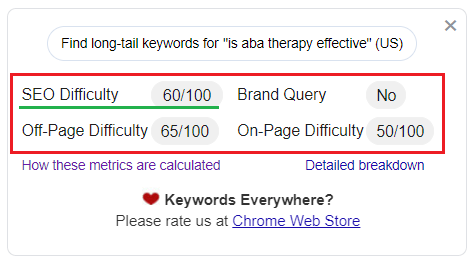
Also Read: How the Top Tools Calculate KD
Your chosen keyword checker tool should effectively measure keyword difficulty and opportunity. In the Keyword Difficulty domain, let’s look at the winner:

Knowing how many referring domains you need for you to rank on page one is a valuable insight that makes Ahrefs stand out. Its Traffic Potential metric is also a great indicator of keyword opportunity, making Ahrefs the clear winner in this department.
5. Keyword Grouping, Filtering, and Clustering options
Each keyword finder from this list has effective grouping and clustering options. By clustering keywords, you can easily group similar search terms together to target both a primary keyword and relevant secondary keywords. Secondary keywords could either be long-tail variants or synonyms of the primary keyword.
For example:
Primary Keyword: keto recipes
Secondary keywords:
- Keto food
- Keto meal ideas
- Easy keto recipes
- Keto recipes for weight loss
- Keto recipes breakfast
- Keto recipes for beginners
Using seo keyword search tools like Semrush, Ahrefs, or Keywords Everywhere, you can easily find a plethora of keyword ideas that can help you add more breadth and depth to your topic which can make both readers and search engines love your content.
Plus, if you combine the search volume of a wider variety of keywords, the traffic potential can become even greater. Adding similar terms also makes your article read more naturally since you aren’t repeating the primary keyword over and over.
Here’s how keywords are grouped among our top three keyword research tools:
Semrush
- Broad match
- Phrase match
- Exact match
- Related
Ahrefs
- Terms match
- Questions
- Also rank for
- Also talk about
Keywords Everywhere
- Related
- People Also Search For
- Trending Keywords
- Long-tail Keywords
All of the grouping features above promote effective content ideation. Another key aspect is configurability, the tool’s ability to help you filter your options and make your search as narrow or wide as you want. Both Semrush and Ahrefs can help you get more granular results with their advanced filters.
You can specify which keywords you want to be included or excluded from the list. You can also filter according to word count, keyword density, search volume, cost-per-click, and so on.
As a browser extension, Keywords Everywhere doesn’t have such robust filtering options but is perfect for those who live and breathe SEO as they can ideate and discover keyword opportunities even without actively searching for them.
For this round, Semrush has a slight edge because of its search intent filtering that allows SEOs to cluster similar keywords more effectively.

6. Competition Analysis
Competition analysis is crucial to help you discover ways to outdo your competition. All of the tools in this list have powerful competitor analysis features.
In terms of competitor keyword analysis, Semrush allows you to:
- Easily check your main organic competitors
- Check the keywords your competitors are ranking for and you are not
- Pull your competitor’s backlinks and monitor changes in their ranking
- View your competitors’ backlink profiles and compare them with your site’s to explore media coverage opportunities you can tap into as well
Ahrefs’ keyword competitor analysis tool helps you:
- View the list of top competing domains
- Find untapped keyword opportunities via Content Gap
- See all of your competitors’ backlinks and use filters to identify the ‘high-impact’ ones
- Check where your competitors’ traffic is coming from by country
Keywords Everywhere also allows you to do competitor keyword research in just a few clicks:
- By visiting a specific URL or page of your competitors and clicking “Organic Ranking Keywords (URL), you can view all the keywords that page is ranking for.
- By visiting any competitor page and clicking “Organic Ranking Keywords (Domain)”, you can view all of the keywords that the site is ranking for.
- You can also perform ‘Competitor Gap Analysis” and compare up to 5 websites including your own to know which keywords your competitors are ranking for that you are not.
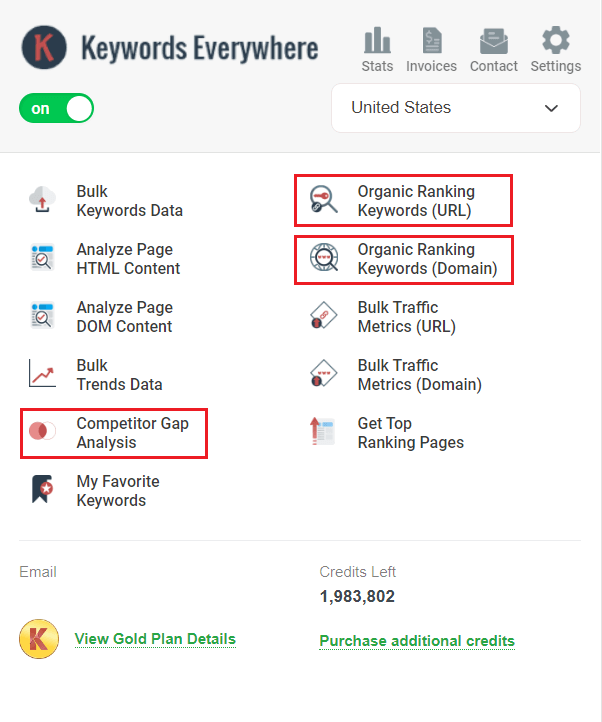
While all of these top-performing keyword research tools allow you to find gaps in your keyword and SEO strategy by checking how the competitors are doing, Ahrefs is a clear winner in this domain simply because of its powerful backlinks data and features.
Their backlinks report shows you which of your competitors has the most backlinks and you can check the topics and formats of their top pages as well. You can even find your competitor’s broken pages through the ‘Best by links’ report, so you can work on replacing that article or reaching out to those linking to the dead page. Just set the HTTP code filter to 404 not found.

7. Number of supported locations
A good keyword research tool should have datasets in different regions. Ahrefs covers data from over 100 countries and also has the largest US keyword database. Semrush offers access to around 28 regional databases, and Keywords Everywhere enables access to 8 including Global. This puts Ahrefs on the lead in this respect:

8. Number of supported platforms and search engines
Ahrefs offers data from ten search engines while Semrush only works with Google. Keywords Everywhere works with 20+ different platforms including Google, YouTube, Bing, Amazon, eBay, Etsy, and so on.

9. Convenience and Ease of Use
Semrush, Ahrefs, and Keywords Everywhere have all managed to acquire their respective sets of loyal user base because they’re all generally easy and convenient to use. All of these tools allow you to export files in various formats including CSV, excel, etc. They also allow you to save the relevant keywords you find for later for easy sorting and organization.
Semrush and Ahrefs are like the Coke and Pepsi of digital marketing. You know they’re both dominant, but you can tell they taste different.
On the other hand, Keywords Everywhere is like the Sparkling Water that makes a refreshing change from the fizzy soft drinks. It’s a refreshing tool that enhances the online user experience of digital marketers.
For an in-depth SEO game, you would need to dive in and really explore the rather steep learning curve of both Semrush and Ahrefs, but for extra oomph to your day-to-day as a digital marketer, you’d feel at ease and efficient if you have a handy extension like Keywords Everywhere that boosts your browser’s functionality for as low as $5 per month.
While both Semrush and Ahrefs have really advanced SEO functionalities, in terms of a refreshing kind of ease and convenience, Keywords Everywhere secures this win as it allows users to minimize the back and forth and flipping between a bunch of SEO tools, giving you accurate information and metrics right where you need them.

10. Pricing
The right SEO tool should fit your needs and budget. Between the two more advanced tools Semrush vs Ahrefs, Semrush has more generous usage limits. On the other hand, Ahrefs has usage-based pricing, which means the more you use the tool, the more you’d have to shell out. Both Semrush and Ahrefs start at around $129 per month and unlock a range of digital marketing tools you can use including Side Audit and other advertising tools.
If you’re looking for just a keyword research tool, Keywords Everywhere’s Bronze plan is as low as $5 per month. You can also toggle our tool to switch it off when you’re not actively working to further save on credits.
Keywords Everywhere has been generally tagged as the ‘best keyword research tool on budget’, and that’s exactly what we try to do– offering robust keyword research functionalities without breaking the bank.

Semrush Plans & Pricing:
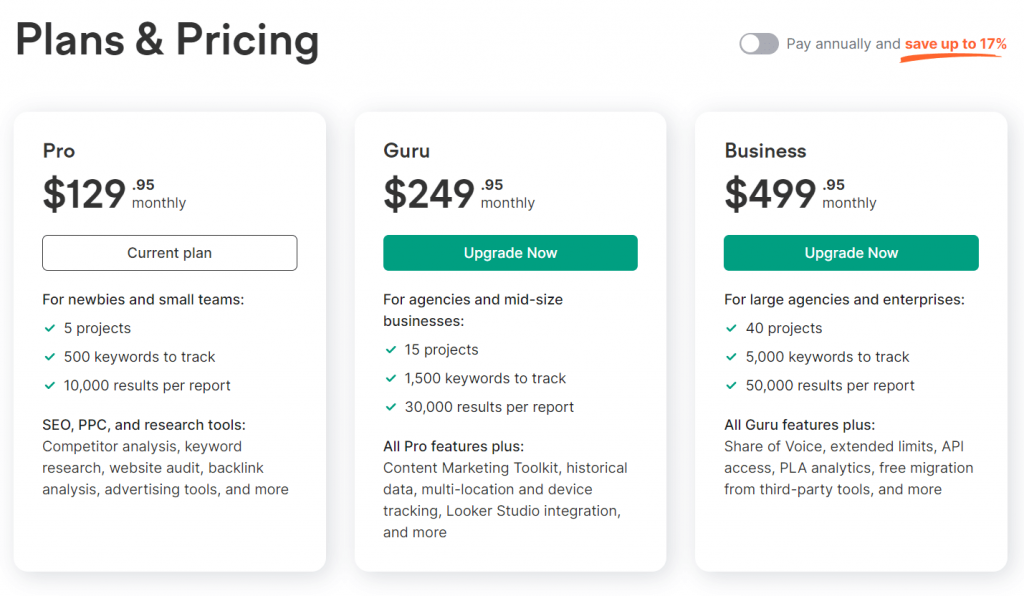
Ahrefs Pricing:
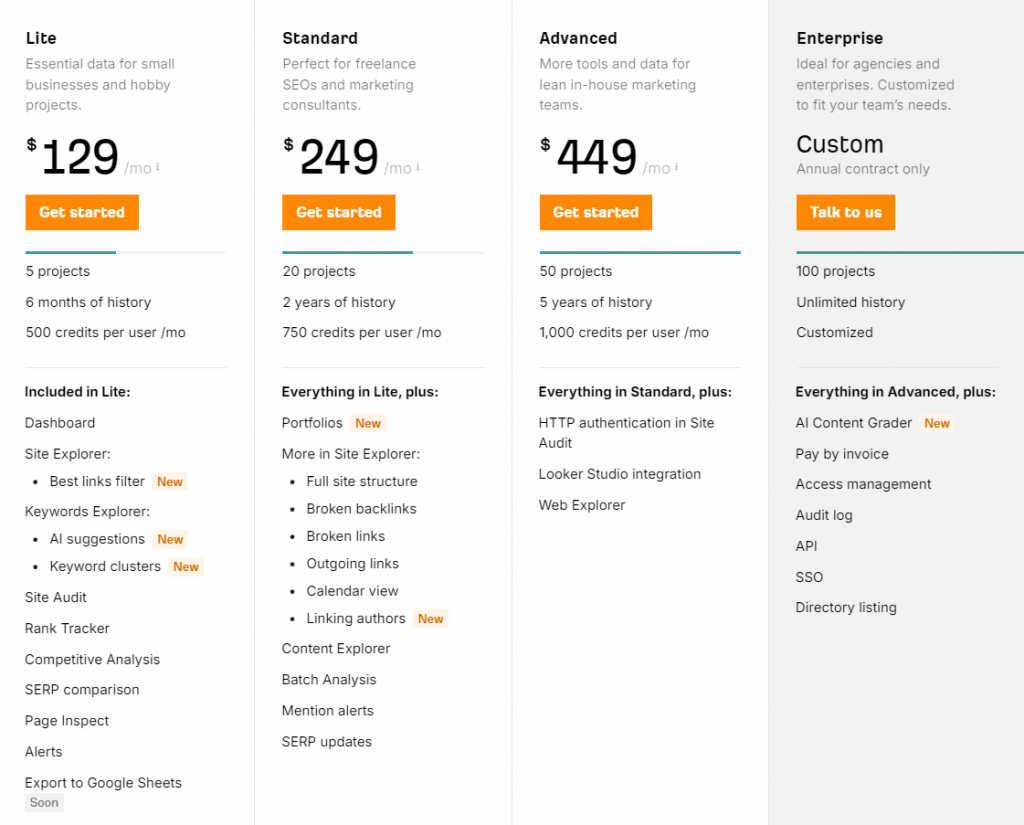
Keywords Everywhere Packages:
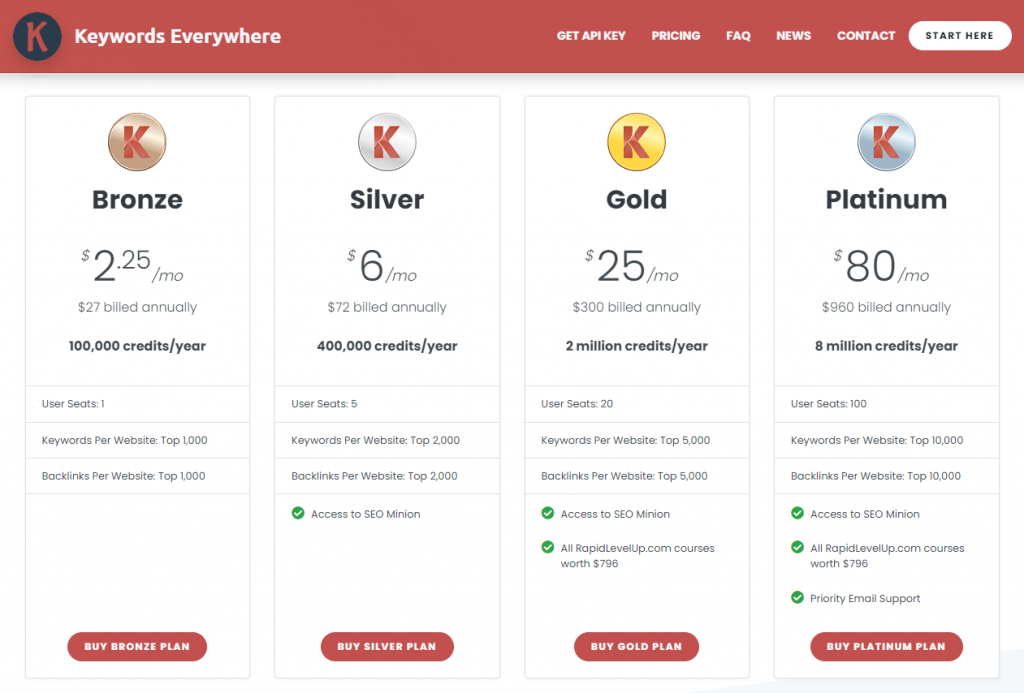
How do I choose the best keyword research tool for me?
To choose the best keyword research tool, you need to:
- Outline your budget
- Determine your SEO needs
- Demo your top choices
- If you have a team, get their feedback on the tools
It’s best if you can get hands-on experience with these different tools to really get the feel of them and better decide whether or not they’re the best option for you.
Keyword research tools have their own strengths and weaknesses. Ahrefs offers robust backlink analysis while SEMrush provides a broader SEO toolkit. Keywords Everywhere, on the other hand, has simplified the keyword research game, saving you a lot of time in the process.
Evaluate your needs and budget and choose the tool that best aligns with your current needs.
Besides, you don’t really have to choose just one keyword research tool. In fact, many SEOs use multiple tools to get a more well-rounded view of the market. For example, some marketers find Ahrefs’s difficulty score to be slightly more accurate than Semrush yet find Semrush’s search volume data to be more accurate than Ahrefs. In cases like that, some SEOs who have the means and appreciate both tools’ features don’t mind subscribing to multiple keyword research tools.
Because of Keyword Everywhere’s super affordable pricing and great value for money, many digital marketers make the most of it to conveniently discover and analyze keywords on the fly. Besides, our tool’s user-friendly interface is perfect for beginners, offering insightful data with minimal setup. In the end, it all boils down to where you are and what you need.
Conclusion
Simply put, keyword research is practically impossible to pull off without using specialized tools. Back in the day, people used to do keyword research manually because of the lack of software and resources. But today, robust keyword research solutions are now at your fingertips. Whatever your needs and budget are, there’s always something for you.


